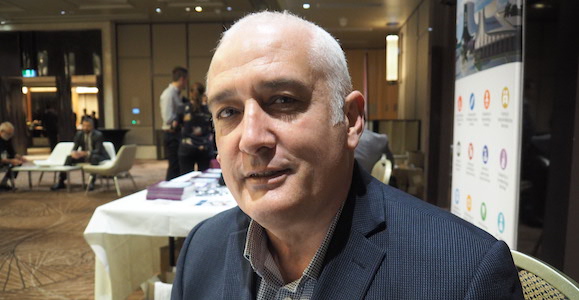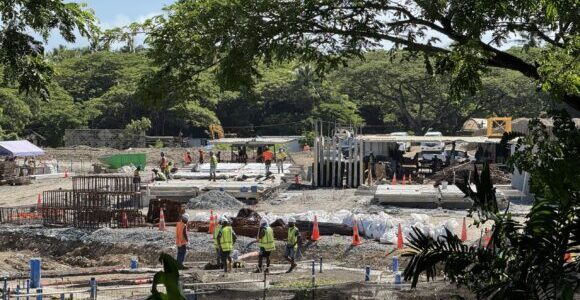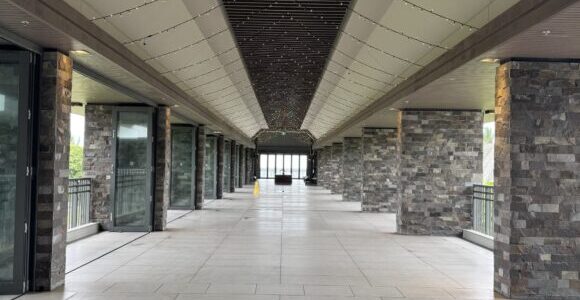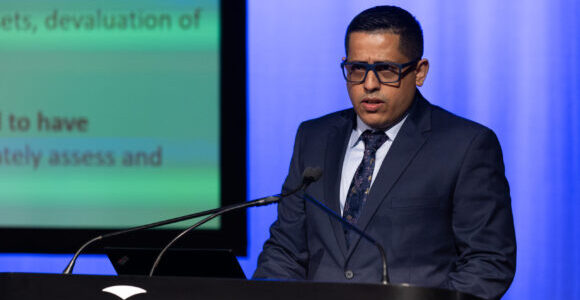Mastercard talks smart chip technology in Papua New Guinea
Mastercard is working with its banking partners to introduce smart card chip technology and contactless payments to Papua New Guinea (PNG). Craig Kirkland, Director of Pacific Islands for Mastercard talks to Business Advantage PNG about this technology and why PNG is an important market for the company.

Mastercard’s Craig Kirkland.
Kirkland believes the chip technology will deliver a payments ecosystem that is ‘world class’, minimising the risk that the older magnetic stripe technology presents. Bank South Pacific is offering chip-enabled cards to its MasterCard customers. ANZ is offering an ANZ Visa debit card.
‘The new technology is referred to as EMV, and it has been extremely successfully globally in driving down card counterfeiting, in particular,’ Kirkland tells Business Advantage PNG. He says Mastercard co-created the EMV (chip) technology (the acronym stands for Europay Mastercard Visa) which has enabled contactless payments, or ‘touch and go’.
‘The introduction of touch and go is an exciting development for PNG.
‘It will give cardholders the convenience of simply tapping their cards for transactions under K50 at merchants that offer contactless as a safe and convenient way to pay.’
For transactions greater than K50 customers would tap their card and input their PIN.
As well as working for domestic, everyday purchases, the new technology will also benefit PNG cardholders when they are travelling overseas, providing access to purchases wherever contactless payments are accepted.
Similarly, the adoption of contactless payments will benefit tourists coming into PNG.
‘These advancements are world class.’
‘Visitors coming to PNG will be able to transact just like they do at home with a contactless card, mobile phone or other wearable device. This is especially attractive for those travelling from Australia, where over 80 per cent of all transactions are contactless.’
High standard
Kirkland says the EMV chip technology that Mastercard is helping BSP introduce will raise PNG acceptance to the same level of quality and security as world-leading markets like Australia and New Zealand.
‘These advancements are world class. They bring the latest technology to PNG, delivering exceptional advancements from a risk, safety and security perspective, but also in terms of making these benefits more convenient and accessible to cardholders.
‘The strategy has more than just a commercial dimension.’
Kirkland says users will be able to take their smartphone’s mobile wallet (such as Apple Pay and Samsung Pay) ‘to Port Moresby and transact with that phone, if my bank gives me that capability.’ He says PNG ‘will very quickly be operating at the same high standards as other international markets.’
Financial inclusion
Kirkland says the strategy has more than just a commercial dimension. ‘We have a very strong financial inclusion ethos at Mastercard, by which I mean we focus [on] helping [to] drive inclusive growth by extending access to electronic payment systems to remote communities and economies, so they can equally benefit from the technology.’
Kirkland points to the Mastercard Centre for Inclusive Growth as an example of the organisation’s philanthropic efforts.
‘We’re increasingly seeing local banks, or the people’s banks as they’re often referred to as, push to be part of the global payments system.’
An independent subsidiary, the Centre’s aim is to combine its data and expertise in a way that empowers community leaders and innovators around the world to help deliver equitable and sustainable economic growth.
Local
Kirkland says in many islands across the Pacific, including PNG, ‘we’re increasingly seeing local banks—or the people’s banks as they’re often referred to—push to be part of the global payments system so they can offer their customers the type of capability and service Mastercard delivers.
‘An example of this is the Bank of Cook Islands, with which we worked closely to deliver a debit product that enabled locals to easily, conveniently and safely shop online.
‘Mastercard is increasingly engaging with telcos.’
‘In doing so, we opened up the door to provide access to new options of purchasing goods and services.’
Kirkland says Mastercard is increasingly ‘engaging with telcos’ in order to develop new products.
The first stage, he says, is to help the telcos ‘become a financial entrant’. The next stage is to ‘provide a digital version of a card’.
Government
Futurist Mark Pesce argues that in PNG telecommunications companies could enter into the banking sector as mobile phone technology takes hold. Digicel Financial Services was the Bank of PNG’s first licensee to collect and transfer money via mobile phones, but MiBank has been operating in this space since 2011, with its MiCash mobile wallet, and BSP’s Wantok Moni and ANZ’s Go Money also enable transfer of money between mobile phones.
Kirkland agrees and highlights the need to deliver new payment flows—but with a realistic appreciation of the limitations presented by the technology available to consumers.






